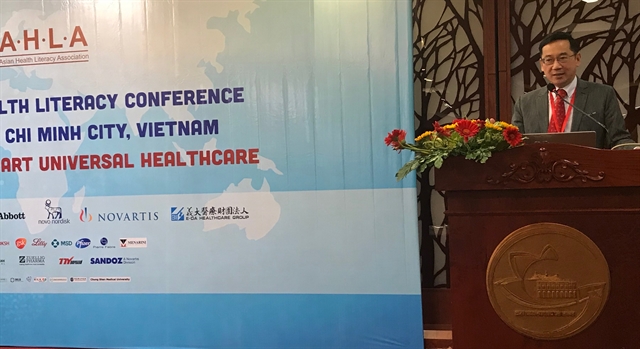 Society
Society

Health literacy can contribute to reducing disparities among different groups of people in accessing universal healthcare services, Professor Dianne Levin-Zamir from Israel's University of Haifa said on Monday (November 11) at an international conference held in HCM City.

|
| Peter Chang, president of the Asian Health Literacy Association, speaks about global health literacy plans and governmental action at a conference on Monday in HCM City. — VNS Photo Gia Lộc |
HCM CITY — Health literacy can contribute to reducing disparities among different groups of people in accessing universal healthcare services, Professor Dianne Levin-Zamir from Israel's University of Haifa said on Monday (November 11) at an international conference held in HCM City.
In many countries, communication with patients and the public is increasingly becoming digital.
“This trend has great advantages, among them bringing health information and navigation directly into homes, allowing for personal data to be stored and then accessed for the benefit of the patient as well as increased efficiency. And it creates big data for analysis and technology development and more,” she said.
According to the World Health Organisation, health literacy reflects a certain level of knowledge, personal skills and confidence that allows individuals to take action and change their lifestyles and living conditions.
Digitalisation, however, requires the ability to seek, find, understand, and appraise health information from electronic sources and apply the knowledge to addressing or solving a health problem, she added.
Until recently, the phrase ”digital divide” has been used to highlight the disparities that exist among the public regarding the use of mobile phones and the skills needed to manage health and healthcare in a digital world in which large groups are assumed to have been left behind, she noted.
An asset-based approach to understanding digital health literacy views digital tools as a means of empowerment for the patient and the public, she said.
Professor Kristine Sørensen from Global Health Literacy Academy in Denmark said that health literacy refers to how people access, understand, appraise and apply information technology to form judgments and make decisions regarding healthcare, disease prevention and health promotion.
Cancer literacy, for instance, is critically important for cancer patients who must make a complex set of diagnostic and treatment-based decisions at times of physical and emotional distress, she said.
Yet, it is unclear to what extent cancer literacy is reflected in cancer strategies such as the national cancer control plans, according to Sørensen.
Professor Paras K Pokharel of the School of Public Health & Community Medicine at the B P Koirala Institute of Health Sciences in Nepal, said: “With the changing dynamics of the public health problems that we face, these challenges demand coordinated actions.”
The UN's sustainable development goals (SDGs) are interconnected and must be shared between every sector in society, he said.
As countries strive for universal health coverage, it is equally important to focus on social determinants of health, health policies and health literacy, Pokharel said.
“While we continue to discuss health policies and social determinants, there is a lack of discussion at the national level on the challenges of a health literacy approach to implement universal health care, about using health literacy to solve problems, and about the appropriate tools and strategies of health literacy, as well as the pertinent issues in which a health literacy approach can make an impact,” he said.
In such a backdrop, discussion is needed on how countries can remove barriers to health literacy and eventually leap forward to attain universal health coverage, he added.
A health-literate health-care organisation includes leadership engagement, workforce preparation, a shame-free environment, plain language writing and design principles, clear oral communications and checks on understanding involving the populations served, and the need for health literacy in high risk situations, according to experts at the conference.
The conference was held by Thủ Đức District Hospital in co-operation with the Asian Health Literacy Association. — VNS




